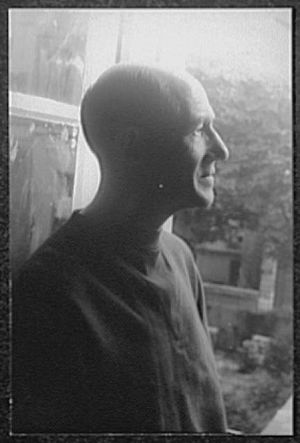Marcel Jouhandeau facts for kids
Quick facts for kids
Marcel Jouhandeau
|
|
|---|---|
 |
|
| Born | July 26, 1888 |
| Died | April 7, 1979 |
| Occupation | writer |
Marcel Jouhandeau (born July 26, 1888, died April 7, 1979) was a well-known French writer. He wrote many books, including stories about village life and works exploring Christian ideas. Jouhandeau's writing style was unique and often focused on the people and places he knew.
Contents
About Marcel Jouhandeau
Marcel Jouhandeau was born in Guéret, a town in France. He grew up mainly surrounded by women, especially his grandmother. For a while, he thought about becoming a priest because he was very religious.
Early Life and Education
In 1908, Jouhandeau moved to Paris. He studied at two famous schools: the Lycée Henri-IV and the Sorbonne. It was during his time in Paris that he started to write. In 1912, he became a teacher at a school in Passy.
Starting His Writing Career
In 1914, Marcel Jouhandeau went through a difficult time. He even burned some of his early writings. But after this period, he started writing again. He created a series of stories called Pincegrain. These stories were about the people in his hometown of Guéret. Pincegrain became his first big success as a writer.
During World War I, Jouhandeau worked as a secretary in Guéret. He published Pincegrain in 1924, sharing his observations of village life.
Family Life
When he was 40 years old, Jouhandeau married Élisabeth Toulemont. She was a dancer known as Caryathis. She was also friends with other famous artists like Jean Cocteau and Max Jacob. After getting married, Jouhandeau wrote more about Christian values.
Marcel and Élisabeth adopted a girl named Céline. Céline later had a son named Marc, who was Jouhandeau's grandson. After Élisabeth passed away in 1971, Jouhandeau lived his final years in Rueil-Malmaison with his grandson, Marc.
Later Years and Controversies
In 1938, Marcel Jouhandeau published some articles that were against Jewish people. These articles were put together in a small book called "Le Péril Juif" (The Jewish Peril). During World War II, when Germany occupied France, he accepted an invitation from Joseph Goebbels to visit Germany.
See also
 In Spanish: Marcel Jouhandeau para niños
In Spanish: Marcel Jouhandeau para niños

